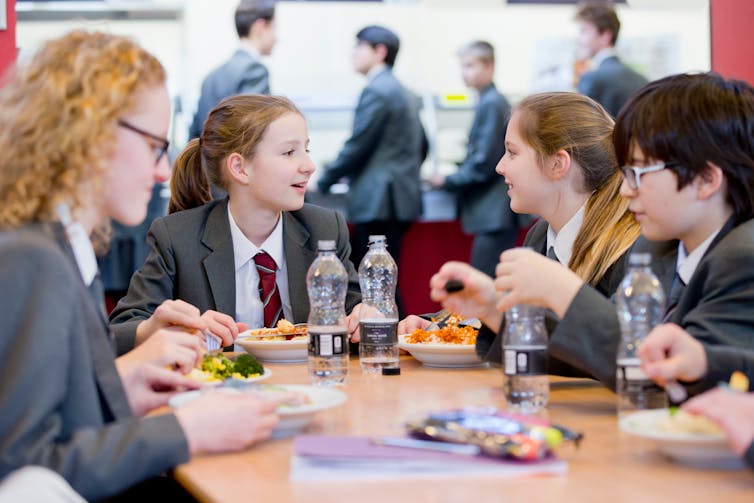
All children in England living in households claiming universal credit will soon be eligible for free school meals, the UK government has announced. This will improve the lives of 500,000 more children and save their families £500 per year.
This will reduce hunger at school. But it will not solve the UK’s child poverty crisis.
In her spending review on 11 June, Chancellor Rachel Reeves described the move – as well as investment in education – as “a downpayment ahead of publication of the Child Poverty Strategy in the autumn”. However, the two-child benefit cap, which the government is considering scrapping, and challenging school budgets, remain major barriers to addressing child poverty and food insecurity.
According to analysis from the Institute for Fiscal Studies, the new free school meals policy will ultimately lift 100,000 children out of poverty and cost £1 billion a year. Under the current system, only families in receipt of universal credit and earning below £7,400 a year qualify for free school meals. This incredibly low threshold has excluded a huge number of children living in poverty from getting a good meal at school.
Reactions have been justifiably positive. Nick Harrison, CEO of social mobility charity the Sutton Trust, has called the move “a significant step towards taking hunger out of the classroom”.
The Institute for Fiscal Studies pointed out, however, that the implied poverty reducing benefits of the policy will only be realised in the long term.

This is partly because, since 2018, the eligibility for free school meals has been temporarily widened to mitigate the impact of changes in the welfare system (the roll out of universal credit) on families. During this period, which ended in April this year, children still received free school meals even if family entitlements to universal credit changed.
This means that many children made eligible for free school meals under the new policy are already receiving them. And far fewer than 100,000 children will immediately be “lifted out of poverty”, as the government had claimed.
A mission against child poverty?
The education secretary, Bridget Phillipson, called the new school meals entitlement part of “the moral mission of this government to tackle the stain of child poverty”. She said: “Today this government takes a giant step towards ending it with targeted support that puts money back in parents’ pockets.”
Such forceful language almost does justice to the scale of the problem. In the UK, 4.45 million children live in poverty. One in five children live in food insecure households – meaning their families struggle to put food on the table.
My own research shows that a fifth of all schools now run a food bank. Extending free school meals is an undoubtedly positive step but it will only scratch the surface of these much deeper problems.
Given the depths of child poverty in the UK, the government must build on this development if it really wants to tackle the problem. Firstly, the government must commit to removing the two-child benefit cap, which limits benefits paid for children to the first two children in a family. Doing so would lift 350,000 children out of poverty immediately and reduce the number of children turning up to school too hungry to learn.
Extending free schools meal coverage is the less contentious policy option. There is, rightly or wrongly, public support for the two-child limit.
But it is also the comparatively less ambitious and effective one. Lifting the two child benefit cap would help more children at a lower cost per child.
Secondly, too often the government asks schools to meet essential costs, duties and innovations out of their existing budgets. In the long run, this disadvantages all children and particularly those living in poverty. This needs to change.
For example, the government currently only funds 75% of the costs of the new national school breakfast clubs. Next year schools will have to find £400 million from their existing budgets to fund pay rises for teachers. This figure dwarfs the amount schools will receive next year for extending free school meals.
Finally, we need to tackle the root causes of poverty and build viable pathways out of it. This cannot be achieved by largely focusing on education and providing more funding to schools – important as this is.
Child poverty is shaped by how our welfare and benefits system is organised, insecure and low-paid work, the high costs of housing and bills, and the absence of high-quality services and community resources that help children thrive. Only by tackling all of these issues in a coordinated and progressive way will be able to make child hunger and poverty things of the past, which is where they belong.
Will Baker does not work for, consult, own shares in or receive funding from any company or organisation that would benefit from this article, and has disclosed no relevant affiliations beyond their academic appointment.
This article was originally published on The Conversation. Read the original article.







